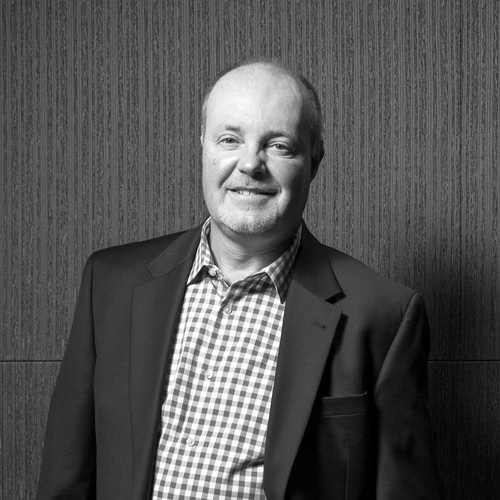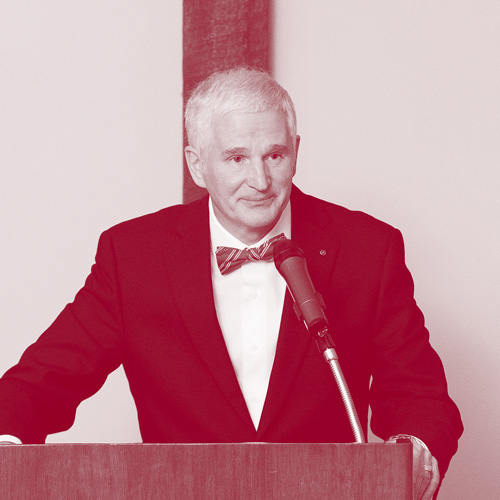Mark Sproat rose from humble beginnings to the upper echelons of corporate law in large part because he listened to and learned from mentors. He discovered his path to success through their example. “Over the years, I have always felt like I was the beneficiary of many great mentors,” says Sproat, executive vice president, general counsel, and secretary at Follett Corporation. “Always express a desire to listen and learn.”
That philosophy originated in his childhood, growing up in a small farming community in central Illinois, where his high school graduating class totaled forty-seven kids. Then he attended Eastern Illinois University, a decision he made mainly because the prospect of going to the much larger University of Illinois scared him to death. Yet, Sproat did move to Chicago after graduation and began working various jobs while he earned an MBA at night. Next, he moved on to earn a law degree. He attributes his continued learning to his parents, whom he says emphasized education.
Plus, Forrest Claypool, an influential figure in Chicago and Illinois politics, also came from Sproat’s hometown. “He challenged me to think independently,” Sproat says. “He was, and is, a big role model.” It was Claypool and Sproat’s wife who encouraged him to pursue his law degree at Loyola University Chicago. “I never would have succeeded without her support,” he adds.
After earning his JD, Sproat began his career at the Chicago office of international law firm Jones Day. “Working at Jones Day was like doing a residency,” he says. “Here I was learning a skill.” After five years at the firm, he realized that he wanted to become an in-house lawyer. To better combine his business and legal skills, he joined human resources consulting firm Hewitt Associates. There, he became manager of its outsourcing group, with about forty attorneys reporting to him.
That’s also where he developed more mentors. “At Hewitt, they had many people willing to mentor, if you asked,” Sproat says. “I found out that asking questions was going to give you much more than an answer to something; it would open the door for more questions. If you demonstrate a desire to listen, you would be shocked at how much you can learn.”
When Aon bought Hewitt and became Aon Hewitt, Sproat was named chief counsel for the new corporation. “But I knew I would never be general counsel there,” he says. “I am a transactional guy, and they needed a litigator.” Another mentor stepped in—his former boss at Hewitt—and arranged a meeting with the CEO of Follett Corporation.
“He didn’t have to do that, but he did,” Sproat says. “I also talked to Forrest Claypool, who I hadn’t seen in years, and he agreed to meet for lunch. He didn’t have to do that either. So many people have been more than happy to help me. I like to think I have helped a number of people and made a number of calls and connections on their behalf to keep that network going.”
Along with the help of his mentors, hard work got Sproat to where he is today. “I’ve been criticized for being a workaholic, and I don’t make it home for dinner very often,” he says. “I’m lucky that my wife understands that. I never would have succeeded without her support.”
He soon joined Follett Corporation, headquartered in Westchester, Illinois, which for 140 years has been higher education’s leading academic retailer and largest wholesaler. Operating in more than 1,250 campus stores, it boasts an assortment of products and services to drive access, affordability, and student success. As executive vice president, general counsel, secretary, and executive committee member, Sproat is responsible for the legal team and all legal functions, asset protection (loss prevention), and the team and facilities support group.
One of his core beliefs is that attorneys should be embedded in the business functions they serve. “I appointed lead counsel for each of our units, and I want them to understand the business and develop relationships with the unit leaders,” Sproat says. “I want those leaders to look to them as their attorney. I was taught that at Hewitt. I had a mentor there who said, and I will never forget this, that as an in-house attorney, your client is the company. You need to understand their needs and requirements and how you can serve them. If they feel you are in the same boat rowing with them, you can accomplish a lot.”
Today, Sproat’s biggest challenge is mentoring his attorneys on how to prioritize. “It’s helping them to understand where they need to concede a point and where to dig in,” he says. “It’s getting them to understand what is truly important. You can argue everything, or you can roll over on everything. There is a balance there. I tell my attorneys, ‘If you are aligned with your business leader, the two of you should be able to come to a resolution.’”

